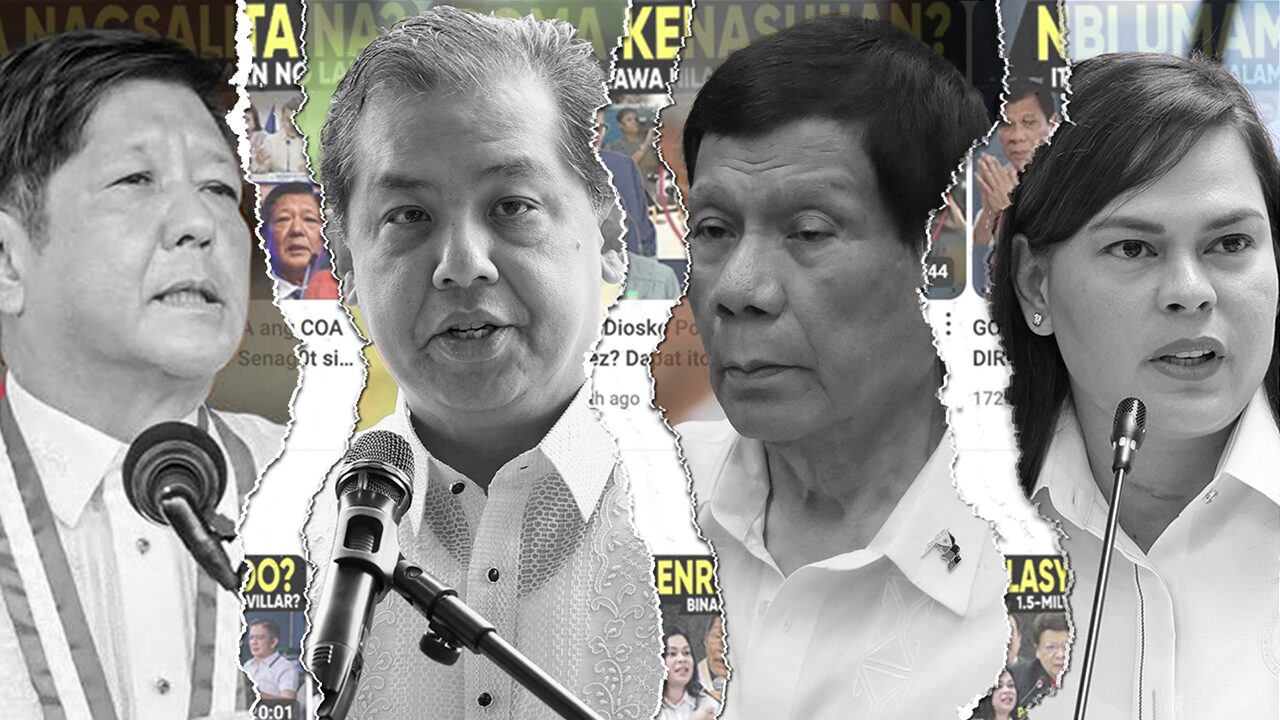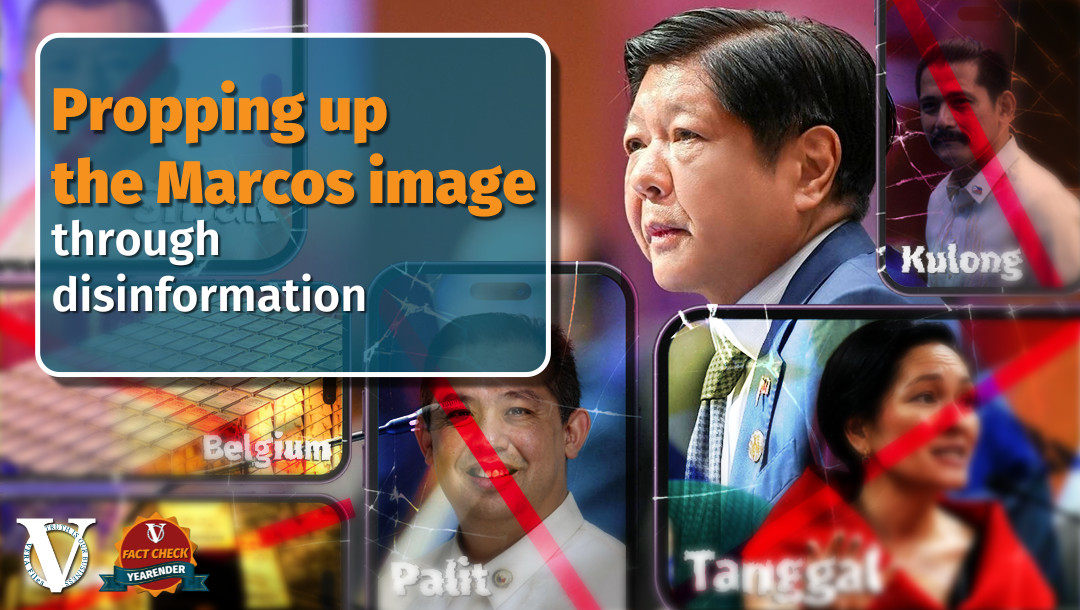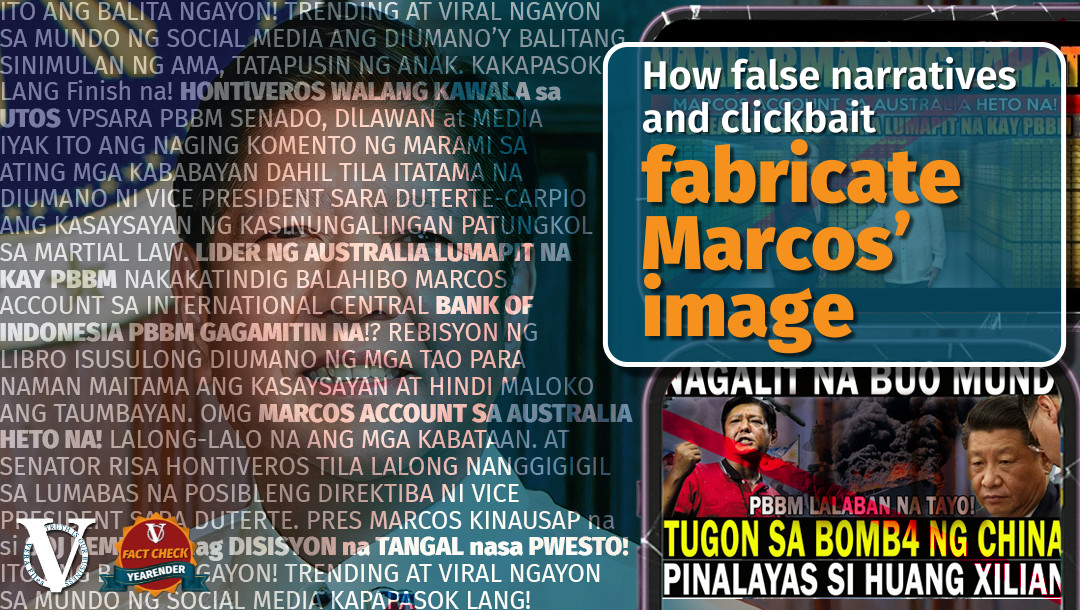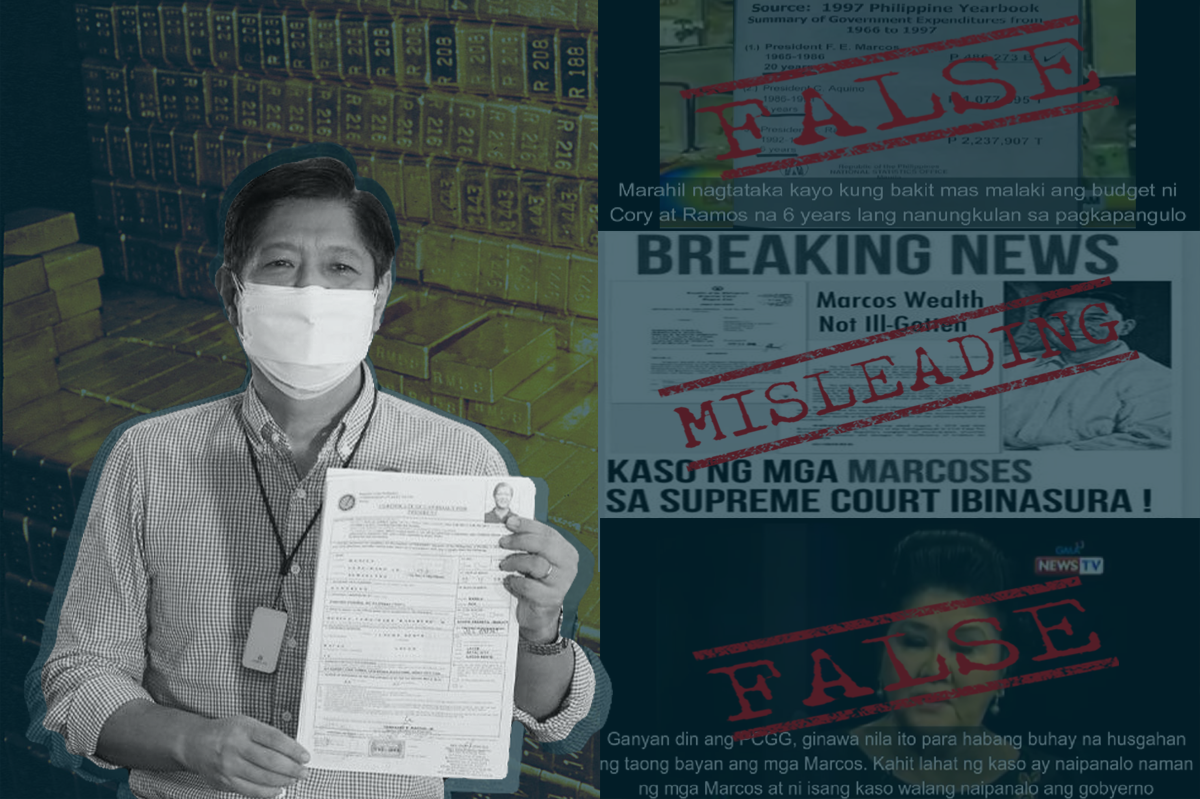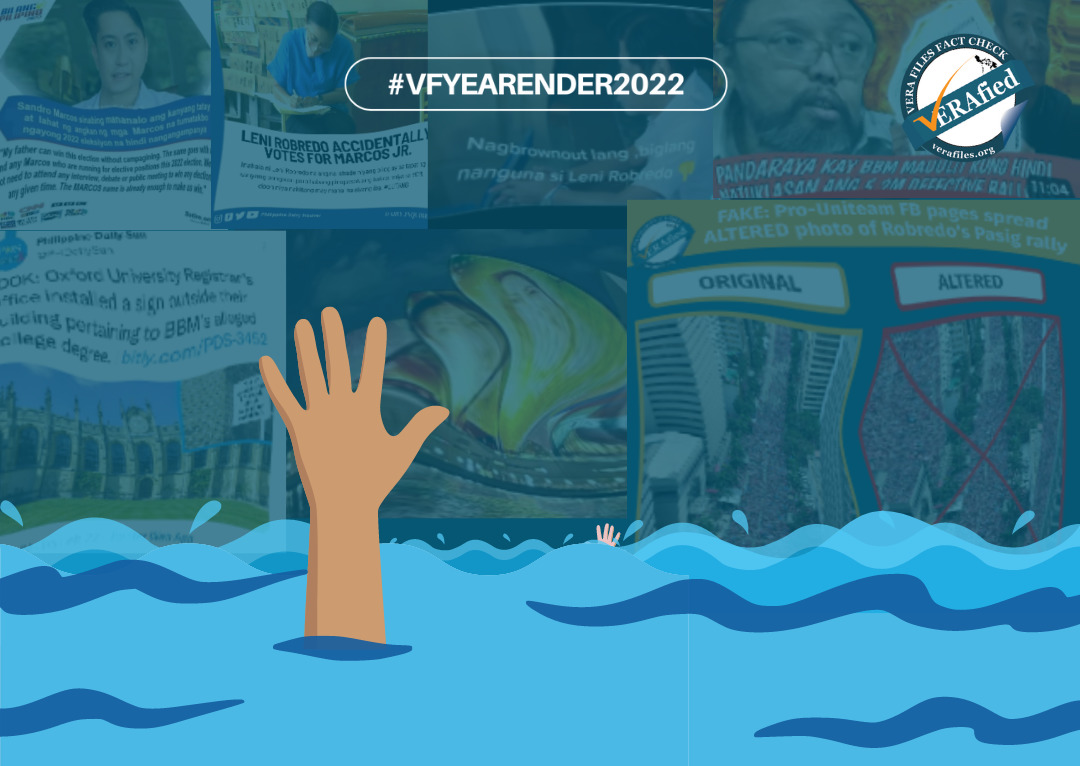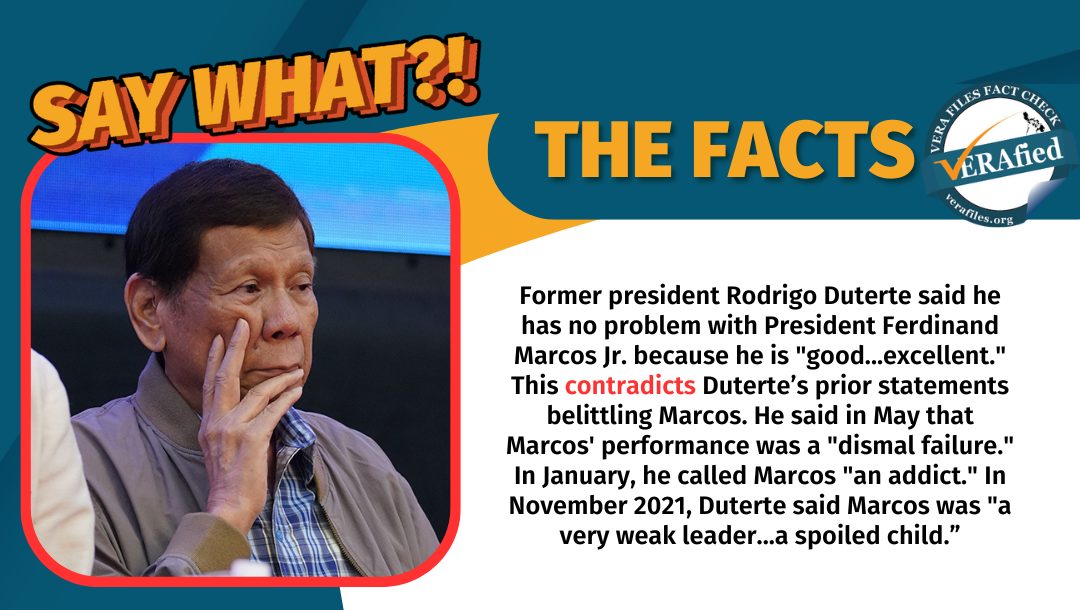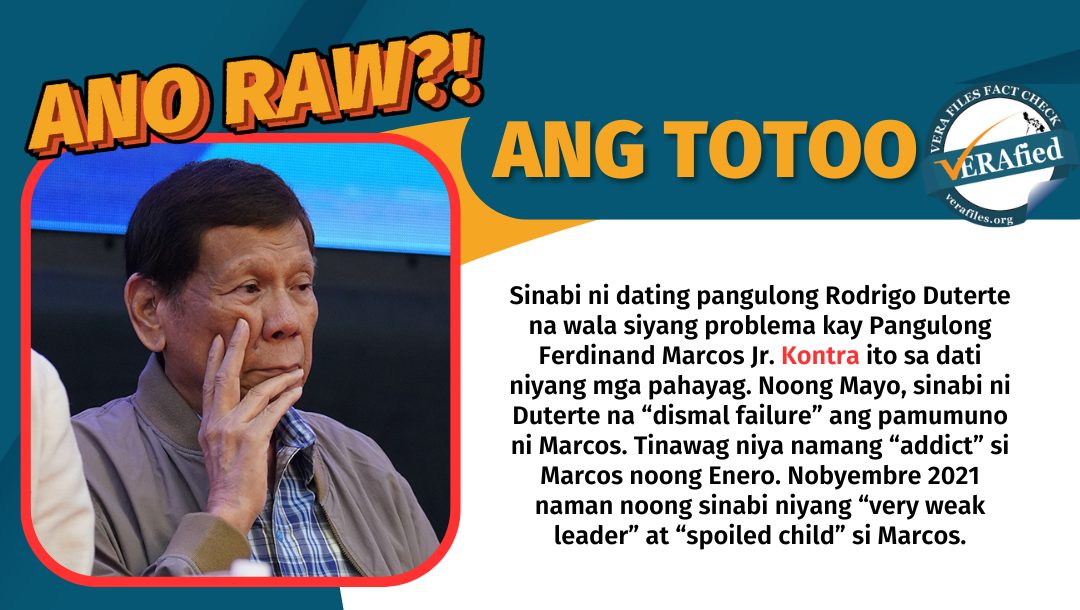Three days after former president Rodrigo Duterte called President Ferdinand Marcos Jr. “a drug addict” on Jan. 28, false videos showing Marcos supposedly ordering his predecessor’s arrest circulated on YouTube.
Three accounts posted an identical video that carried the erroneous headline and racked up over 84,000 interactions with a mix of pro-Marcos and pro-Duterte sentiments.
The collapse of the Bongbong Marcos-Sara Duterte alliance – dubbed as the “UniTeam” – two years after its election victory in 2022 set off a deluge of social media users spreading disinformation that further polarized the citizenry.
Out of 377 articles published from Jan. 1 to Dec. 3 by VERA Files Fact Check, 59 claims (or about 15%) involved the former president, Vice President Sara Duterte, Marcos and their respective allies. Three-fourths of these conveyed false information and came from the online video sharing platform YouTube.
Peddlers appeared to have picked a side to throw in their support as the formerly allied Marcos and Duterte families turned against each other, with the latter seeming to have gotten the better end of the stick.
Most of these claims, based on VERA Files Fact Check’s analysis, depicted Sara Duterte as a stronger leader than Marcos while also bolstering support for the vice president, and attributing attacks against her and her family to the current administration.
“They (UniTeam supporters) were expecting Marcos to be a strongman like Rodrigo Duterte, but they did not get that,” explained Maria Elize Mendoza, political science professor at the University of the Philippines Diliman.
See FACT CHECK YEARENDER: Pangako o Pangarap? Marcos Jr.’s doublespeak
“Sara Duterte, from the very start, is already brute. The Dutertes already have a reputation for being tough guys in Philippine politics so it’s easier to add to that in terms of content,” she said.
Rage-baiting
Disinformation actors have spread such claims through rage-baiting or a form of clickbait that uses provocative and emotionally-charged words or phrases in their headlines and captions to elicit a strong reaction from the audience.
Among the claims we fact-checked, the words grabe (severe/harsh), matindi (extreme), nagulat (shocked), nagkagulo (led into chaos) and nakarma (got karma) were commonly used as rage-bait keywords.
Studies have shown that rage or anger is a primary driver of virality online and has been effective in spreading political disinformation. Fact-checking organization Logically Facts reported that peddlers have mastered the art of tapping into people’s internal biases and emotions in the way they package untruthful claims.
The word grabe, which appeared in six claims, were used in three different instances to show that Sara and members of her family were being persecuted, and that people must be alarmed about it.
- NAG RE-SIGN NA. GRABE ANG GINAWA NILA KAY VPSARA. LAHAT NAGULAT! (Resigned already! What they did to VP Sara was harsh. Everyone was shocked!)
- KAKAPASOK LANG Grabe ang Nangyare sa Davao Mayor Baste Duterte Tanggal na (Just in. What happened to Davao City Baste Duterte is severe. He was removed.)
- BREAKING NEWS! Delekad0 to! Grabe ang Genawa nila kay FPDUTERTE? Diosk0 Dapat tong Malaman ng Lahat (This is dangerous! They did something harsh to former president Duterte? Oh God, everyone must know about this)
“It’s the typical vlogger pattern that the headlines are clickbait. So, it’s really inviting views, inviting hate, or inviting anger from any of the supporters of either the Marcoses or the Dutertes,” said Mendoza.
Strong Sara, weak Bongbong
Along with highlighting the supposed political oppression of the Dutertes, disinformation also sketched an image of the vice president as a strong leader supported by investors, world leaders and the armed forces.
- FACT CHECK: Investors leave after Sara resignation has NO BASIS
- FACT CHECK: Claim that Trump invited the Dutertes to the U.S. BASELESS
- FACT CHECK: AFP NOT backing Duterte, declares neutrality
In contrast, Marcos was portrayed as a weak leader who was at risk of losing his power, with the military supposedly planning to stage a coup to topple him.
- FACT CHECK: Duterte DID NOT lead police, military attack on Malacañang
- FACT CHECK: Sara DID NOT declare coup against Marcos
- FACT CHECK: AFP denies FALSE claim about ‘generals’ walkout’
Referred to as the “Tiger of the North” during his 2022 presidential run, Marcos eventually became known to vloggers as “kuting” (kitten) in these videos.
Disinformation channels have also amplified allegations that the president is a “drug addict,” echoing former president Duterte’s accusation against him in January. Such posts claimed that Marcos’ alleged substance abuse had been exposed globally and that law enforcement authorities are out to get him.
- FACT CHECK: NO arrest warrant vs. Marcos
- FACT CHECK: FAKE CNN report on Marcos alleged drug use spreads online
- FACT CHECK: Marcos DID NOT skip APEC due to drug test
“These kinds of claims support the narrative that Marcos is weak and that he is not presidentiable, and that Sara is really the one who should be president,” Mendoza said.
Apart from using emotionally triggering content, Mendoza added that vloggers on YouTube tend to follow and capitalize on current events to generate more views.
VERA Files Fact Check noted that the news about the deepening Marcos-Duterte rift accompanied peaks of online disinformation in 2024.
Pro-Duterte YouTube accounts top sources of Marcos-related disinformation
YouTube channel Pinas News Insider was the top source of Marcos-related disinformation, with 17 video posts fact checked by VERA Files. It currently has 1.06 million subscribers and 101.13 million total views.
The account, created on Dec. 26, 2015, published content that mainly boosted the Dutertes’ image and attacked Marcos and his allies.
At least five of its posts portrayed Vice President Duterte as opposing the Marcoses, and attracting support from foreign countries such as Cambodia, Malaysia, France and the United States.
- FACT CHECK: Sara DID NOT declare coup against Marcos
- FACT CHECK: Claim that Cambodia deputy PM forged alliance with Sara Duterte MISLEADS
- FACT CHECK: NO alliance formed between France and Sara
- FACT CHECK: Malaysian PM DID NOT visit OVP
- FACT CHECK: Claim that Trump invited the Dutertes to the U.S. BASELESS
Meanwhile, House Speaker Martin Romualdez was the subject of attack on at least 10 unique accounts, including Pinas News Insider.
- FACT CHECK: Marcos, Sara did NOT appoint Rodrigo Duterte as House speaker
- FACT CHECK: Marcos did NOT stop signature campaign for Cha-cha
- FACT CHECK: Duterte NOT replacing Romualdez as new House speaker
- FACT CHECK: Alice Guo DID NOT expose Marcos ties to POGO
- FACT CHECK: Marcos, Senate did NOT tag Romualdez as wanted individual
- FACT CHECK: Romualdez NOT sentenced to life imprisonment
On Jan. 15, four disinformation posts claimed that Marcos stopped the signature campaign for Charter change. Its headline read:
“GUMUHO PANGARAP NI ROMUALDEZ! PEOPLES INITIATIVE PINATIGIL NA NI PBBM! DI KAYA ANG TAUMBAYAN.
(The dream of [House Speaker Martin] Romualdez crumbled! People’s initiative stopped by Marcos! The public could not take it.)”
Romualdez, the president’s cousin, reportedly coordinated with the People’s Initiative Modernization and Reform Action for the controversial signature campaign for Charter change at the start of 2024.
Read FACT SHEET: Is there a ‘fourth mode’ of Cha-cha?
In the videos, Romualdez was often referred to as “Tamba,” short for tambaloslos.
The term emerged when the vice president used it in a cryptic post in 2023. It supposedly refers to a greedy “mythical creature” with a large mouth in Visayan, Bicolano and Mindanao folklore.
Red flags
A number of the disinformation sources that VERA Files Fact Check monitored exhibited traces of coordination. These include using similar scripts for their video content, following the same thumbnail formats or cross-posting within a few days of interval.
For example, from April 8 to 11, four different social media accounts spread a spliced video showing that Duterte had resigned and that Marcos ignored her before boarding a plane.
See FACT CHECK: Sara DID NOT resign, video of Marcos snub SPLICED
Duterte did resign from her Cabinet posts on June 19, three months after this piece of disinformation went viral.
Between April 20 and 24, at least four Facebook and TikTok users spread a fake video of Marcos supposedly directing the Armed Forces to retaliate against China. It also lambasted former president Duterte’s supposed “gentleman’s agreement” on Ayungin Shoal.
VERA Files Fact Check found that the audio clip was generated by artificial intelligence.
See FACT CHECK: Audio clip of Marcos calling Duterte’s ‘gentlemen’s agreement’ with China treason FAKE
Gian Libot, a digital engagement specialist, likened these video disinformation tactics to “copypasta” messages – or pieces of text replicated across the internet.
“Maybe they’ll add a little bit more spin. Maybe they’ll just clip like five minutes of the one hour discussion that happens [on] another platform,” he said, stressing that these are red flags for coordinated behavior.
Libot further pointed out that there may be “some degree of machinery or organization” behind the similar divisive content. “But apart from that, you’ll definitely have accounts that are already self-incentivized,” he added.
YouTube has several requirements to earn on its platform, including having a minimum number of subscribers (typically ranging between 500 and 10,000).
The average follower count of the YouTube accounts that have posted online disinformation, based on VERA Files Fact Check’s database, is 278,730. It is not clear if these accounts are monetized or how much they get from creating such content on YouTube.
Under YouTube’s policies, creators are prohibited from publishing misleading information that could discourage people from census participation, manipulated or doctored content and misattributed content that may pose serious risk of harm.
Drowning out voices
With the Duterte and Marcos clans generating a lot of “artificially amplified” noise in online spaces, Libot said groups that offer differing opinions can get drowned out.
This trend seems to reflect in the disinformation landscape as well. Claims related to personalities from the so-called traditional opposition have lessened this year compared to the past two years, data from VERA Files Fact Check show.
We fact-checked seven claims related to opposition figures, specifically Sen. Risa Hontiveros, former senator Antonio Trillanes IV and former vice president Leni Robredo. This figure is significantly lower than the 66 and 15 claims that were debunked in 2022 and 2023, respectively.
“Because disinformation happens on a much larger scale, a lot of the trash content or exchanges that happen online are dominated by some sort of leading clans that are fighting in whatever political machinery or disinformation machinery supporting them,” Libot added.
Amid the worsening Marcos-Duterte rift, claims that show either side supposedly building an alliance with Robredo have appeared.
In June, there was a claim that Marcos appointed Robredo as Education secretary following Duterte’s resignation. Meanwhile, a fake quote card of Robredo expressing support for Duterte’s use of confidential funds emerged in December.
“They know these Robredo supporters have a significant base and they can make things happen. It’s a matter of getting these people to their side,” Mendoza said.
In present online spaces dominated by the Marcoses and the Dutertes, Libot believes “opportunities for anybody who’s interested in carving out their own space” remain open.
“There have also been indicators that audiences want more authenticity. If you can hit the right type of tone, the right type of content, you can definitely carve out a space for yourself,” he said.
Mendoza, for her part, stressed the need for the opposition and its supporters to strengthen its political standing, and take up space on-ground and online leading up to the 2025 midterm and 2028 presidential polls.
“The opposition cannot rely on just a few personalities alone. We need […] to be able to voice out our opposition so that the Marcos and Duterte supporters cannot continue to hijack political conversations,” she added.
